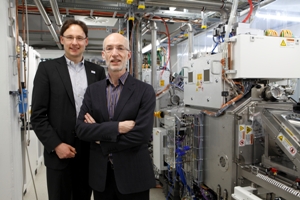Apr 16 2014
Professor Stuart Parkin of the IBM Almaden Research Center in San Jose, California, USA, received the 2014 Millennium Technology Prize for his contributions to interdisciplinary materials research.
The British-American experimental physicist is a Fellow of the Gutenberg Research College (GRC) and an external member of the Graduate School of Excellence "Materials Science in Mainz" (MAINZ) at Johannes Gutenberg University Mainz (JGU). He has been given the award in recognition of his research into innovative digital data storage concepts and spintronics. Stuart Parkin's numerous inventions, including the spin valve and a technique for the affordable manufacture of these nanometer-size sandwich structures that can be used as hard drive reader heads, have led to a 1,000-fold increase in data storage capacity, making possible cloud computing for social media and the big data revolution. The international innovation prize is worth EUR 1,000,000 and is one of the most prominent awards for technological innovations that have contributed significantly to improving the quality of human life and the promotion of sustainable development.
 Professor Mathias Kläui and Professor Stuart Parkin (right) in front of the new Rotaris industrial deposition machine. photo: Thomas Hartmann
Professor Mathias Kläui and Professor Stuart Parkin (right) in front of the new Rotaris industrial deposition machine. photo: Thomas Hartmann
"There is no doubt that Stuart Parkin is one of the most eminent scientists in his field," said Professor Georg Krausch, President of Johannes Gutenberg University Mainz, offering his congratulations. "Materials research has a long and very successful history in Mainz. As a GRC Fellow at our university, Professor Stuart Parkin works closely with Mainz-based materials scientists and doctoral candidates helping to improve the international links of the MAINZ Graduate School of Excellence as well as bringing it into contact with industrial companies around the world." Three doctoral candidates of the graduate school are currently undertaking research in Almaden, and Parkin is also acting as a secondary advisor in a number of doctoral projects at MAINZ and in the SpinNet network.
Stuart Parkin's field is that of spintronics, an advanced technology to which he and his research team have contributed many significant discoveries and developments. "By appointing Stuart Parkin a Fellow of the Gutenberg Research College, Mainz University made a significant contribution towards enhancing the potential of our materials science research focus and further enhancing the university's scientific profile. The awarding of the 2014 Millennium Technology Prize to Stuart Parkin once again confirms that we took a good decision and we would like to congratulate Stuart Parkin on this achievement," stated Professor Matthias Neubert, Director of the Gutenberg Research College and head of the Theoretical High Energy Physics group at JGU.
Parkin is an IBM Fellow, IBM's highest technical honor, and also Manager of the magnetoelectronics group at the IBM Almaden Research Center. He is a consulting professor at Stanford University and, since April 1, 2014, Director of the Max Planck Institute for Microstructure Physics in Halle, Germany. Stuart Parkin was awarded the Gutenberg Research Award by the Graduate School of Excellence "Material Science in Mainz" (MAINZ) in 2008. He has continued to collaborate closely with scientists and doctoral students in Mainz ever since. In May 2011, he was appointed a Fellow by the Gutenberg Research College with the aim of promoting cooperation.
One such example of cooperation is his joint project with Professor Mathias Kläui of the Institute of Physics at JGU, Director of the MAINZ Graduate School of Excellence, Professor Gerhard Jakob of the JGU Institute of Physics, and Professor Claudia Felser of the Institute of Inorganic Chemistry and Analytical Chemistry at JGU. The project resulted, thanks also to the support provided by the state of Rhineland-Palatinate and the EU, in the acquirement of a deposition machine to aid in the development of new materials. This now forms part of the technology platform at JGU, which cooperates with partners based in Rhineland-Palatinate, such as the University of Kaiserslautern and regional businesses, to create materials with innovative functions that can be employed, for example, in energy-saving microelectronic applications. Within the context of jointly supervised doctoral projects, Parkin works here on materials with special properties. Using the Rotaris deposition machine, the researchers can apply these materials directly to large wafers that are suitable for industrial needs.
The Gutenberg Research College (GRC)
The Gutenberg Research College (GRC) was established in 2007 as a central strategic tool to attract excellent researchers to JGU – a milestone on the path to excellence-oriented university governance. Its executive committee is made up of outstanding researchers from JGU and its non-university partner institutions. Committee members are appointed by the University President in consultation with the University Senate based on their research achievements. The GRC advises the University Administration and the Senate on strategic aspects of research and also promotes individual excellence by awarding fellowships to outstanding researchers.
The Graduate School of Excellence "Materials Science in Mainz" (MAINZ)
The MAINZ Graduate School of Excellence was initially approved in the first round of the Excellence Initiative in 2007 and received a five-year funding extension in the second round in 2012 – a huge success for the Mainz materials scientists and a massive boost for the promotion and mentoring of young research talents. The MAINZ Graduate School is a joint project of JGU, the University of Kaiserslautern, and the Max Planck Institute for Polymer Research. The field of spintronics is a special focus of research at MAINZ and benefits from the cooperation with leading international partners. MAINZ provides for the excellent training of outstanding doctoral candidates from Germany and abroad in the field of materials science.